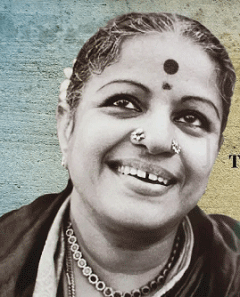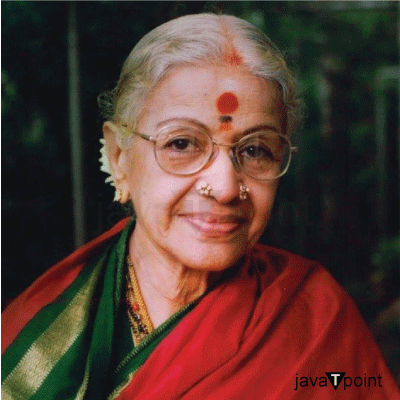M. S. Subbulakshmi
IntroductionThe love and contributions M.S. Subbulakshmi made to Indian music made her name famous for all time. She journeyed into the complexities of music like an explorer and returned with diamonds to perform diverse Indian music genres. Her work demonstrated a deep appreciation for musical beauty, and her voice reflected her soul's radiance. M.S. Subbulakshmi represented the linguistic, cultural, and religious variety of India. She started empowering women by opposing male dominance in the Carnatic music scene. Quick Facts
Personal Life and FamilyAccording to M.S., her mother wanted her to marry the man of her choice. Therefore, she ran from her. It was incredibly difficult for her mother to understand the young singer's determination to find love rather than money. In 1936, she met Sadasivam, who helped her find accommodation. Furthermore, he used his funds to pay for her film debut. Four years later, in 1940, they both got married. Because of his previous marriage, Sadasivam was already a father. M.S. lavished his kids with respect and devotion, treating them as his own. She was affectionately referred to as "Amu Paati" by the children. First Indian Female Musician to Receive Bharat Ratna (1966)Karnataka's M. S. Subbulakshmi was a well-known composer. Madurai Shanmukhavadivu Subbulakshmi is her full name. She was the first singer in the nation to get the "Bharat Ratna," India's highest civilian honor. The public continues to like her singing, particularly of the bhajans. She was the first Indian performer to appear before the U.N. General Assembly in 1966. She made and released her first recording when she was just 10 years old. In her younger years, M.S. had a few Tamil film appearances. Sevasadanam, her debut movie, was released on May 2, 1938. Making of the LegendSubbulakshmi was born on September 16, 1916, into a musical family in Madurai, Madras, India. Her mother was a well-known veena player and frequent stage performer, while her grandmother played the violin. Her genes were musical. She began studying Carnatic music when she was a small child under the guidance of Semmangudi Srinivasa Iyer, and later she received training in Hindustani music from Pandit Narayanrao Vyas. She quickly grasped the various music styles that reflect India because she is a quick learner. At eleven, M.S. performed on stage for the first time in front of an audience alongside renowned musicians such as violinist Mysore Chowdiah and mridangam player Dakshinamurthy Pillai. At 13, she impressed the crowd during a performance at the Madras Music Academy. By the time she was 17, she had effectively attracted the attention of several legendary people in the Indian music industry. She quickly became a national hero due to her talent for singing and simplicity. She visited overseas festivals as an ambassador for India, showcasing all things artistic and cultural. She received a request to perform at the 1963 Edinburgh International Festival, which took place in Scotland. She used this performance to start her pole-to-pole journey through India's musical legacy. On October 23, 1966, Subbulakshmi Ji was invited to perform at the U.N. Day event by former U.N. Secretary U. Thant. She impressed her audiences by singing the "Jagadoddharana Adisidaleshoda," a Krithi in the Raag "Kapi" created by Purandaradasa. At the end of the performance, she performed another song in Sanskrit called "Maithreem Bhajatha," which was written by Kanchi Kamkotipeetham's Jagad guru Shri Chandrashekharendra Saraswati (Mahaperiyava). She performed at London's Royal Albert Hall to show her talent. The Russian government asked MS Subbulakshmi to perform at the Moscow Festival of India in 1987. Her skill spread overseas, captivating and influencing audiences everywhere. In honor of the 50th anniversary of MS Subbulakshmi's epic performance at the U.N. in 1966, the U.N. released a stamp in her honor. She is known as "the Queen of Carnatic." The fans of Carnatic music, or "Rasikas," will always respect her personality, which was a mirror of the songs she sang! 
Movies and PerformanceM.S. performed in a few Tamil films when she was younger. Sevasadanam, her debut film, was released on May 2, 1938. The lead actor in this movie, which K. Subramanyam directed, was F.G. Natesa Iyer, who starred opposite Subbulakshmi. Both critically and financially, it was successful. One of the first Tamil films to be set in a modern social environment and to promote reformist social ideas is Sevasadanam. The novel Bazaar-e-Husn by Prem Chand is the basis for the movie. Sevasadanam was called an "unusual film" for adopting the theme of marriages between young girls and old men (which had social approval) by the senior Marxist leader N. Sankaraiah. He claimed that the movie effectively depicted the "mental agony of the aged husband" and the "sufferings of the girl." Tamil film historian and critic Aranthai Narayanan, in his book Thamizh Cinemavin Kathai (The Story of Tamil Cinema), writes, "Sevasadhanam proved a turning point in the history of Tamil cinema." The elderly husband, who had undergone a complete transformation, was seen in the climax tossing aside his "sacred thread," which represents his Brahmin superiority, with utter disgust. It was a shocking setback to the then-dominant Brahmin ideology. MS Subbulakshmi also played Narada in the 1941 movie Savitri to raise money for the publication of Kalki, her husband's Tamil nationalist publication. In the title role in the 1945 movie Meera, she played the Rajasthani saint-poetess who gained national recognition. In 1947, this film saw a Hindi remake. Famous Works'Suprabhatam' (Early Morning Hymns), 'Bhajagovindam' (written by Adi Shankaracharya honoring Lord Krishna), 'Kurai OnrumIllai' (authored by Rajagopalachari), 'Vishnu Sahasranamam' 'Hanuman Chalisa' (Prayers to Lord Hanuman), etc. are some of her most well-known compositions. All of these and many other compositions by M. S. Subbulakshmi are guaranteed to be in the collection of any devoted fan of Carnatic classical music. 'Vaishnava Jana to' is a heartfelt song that is another powerful creation. Anyone who listens to it would cry because of her superb singing and pronunciation. Foreign TripsSubbulakshmi quickly rose to the position of ambassador for all cultural things in India and participated in numerous international events on its behalf. She received an invitation to Scotland in 1963 to participate in the renowned Edinburgh International Festival. Her stunning performance in the U.K. earned her an invitation to perform at Carnegie Hall in New York, which enabled her to go on her subsequent international tour. In 1982, she was allowed to showcase her talent in London's famed Royal Albert Hall. She received an invitation from the Russian government to perform at the Festival of India in Moscow five years later. When Subbulakshmi traveled to Canada and the Far East, love songs accompanied her wherever she went. Some of Her Elite FansM.S.'s exceptional talent attracted a vast following. Mahatma Gandhi, Jawaharlal Nehru, Sarojini Naidu, Lata Mangeshkar, Ustad Bade Ghulam Ali Khan, and Kishori Amonkar were among her admirers. She was called the "Goddess of perfect note" by Bade Ghulam Ali, while Jawaharlal Nehru called her the "Queen of Music." Awards and Honors
Social WorksAlong with performing in more than 200 charity concerts, M.S. Subbulakshmi donated most of her award money to good causes. She had raised more than one crore rupees from all her charity events, which was a significant sum at the time. She created several top-selling records during her lifetime and gave the earnings to charitable causes. LegacyA bronze statue of her was constructed by the Tirupati Urban Development Authority in 2006, and it was inaugurated by Y. S. Rajasekhara Reddy, the then chief minister of Andhra Pradesh. Despite M.S. having a postage stamp released in 2005, the United Nations released her stamps to commemorate her birth's 100th anniversary. A certain type of silk saree in Kancheepuram was named for her. A Message by SubbulakshmiThe kind M.S. Subbulaxmi always counseled music lovers to concentrate on developing purity in their voice and faithfully follow the "shruti." She stated in an interview that students should sincerely practice voice culture and voice cultivation to master the knowledge of the precise placements of swars and the way they are woven in various ragas. Timeline of M. S subbulakshmi's Life
Next TopicMasoom Sharma
|
 For Videos Join Our Youtube Channel: Join Now
For Videos Join Our Youtube Channel: Join Now
Feedback
- Send your Feedback to [email protected]
Help Others, Please Share









